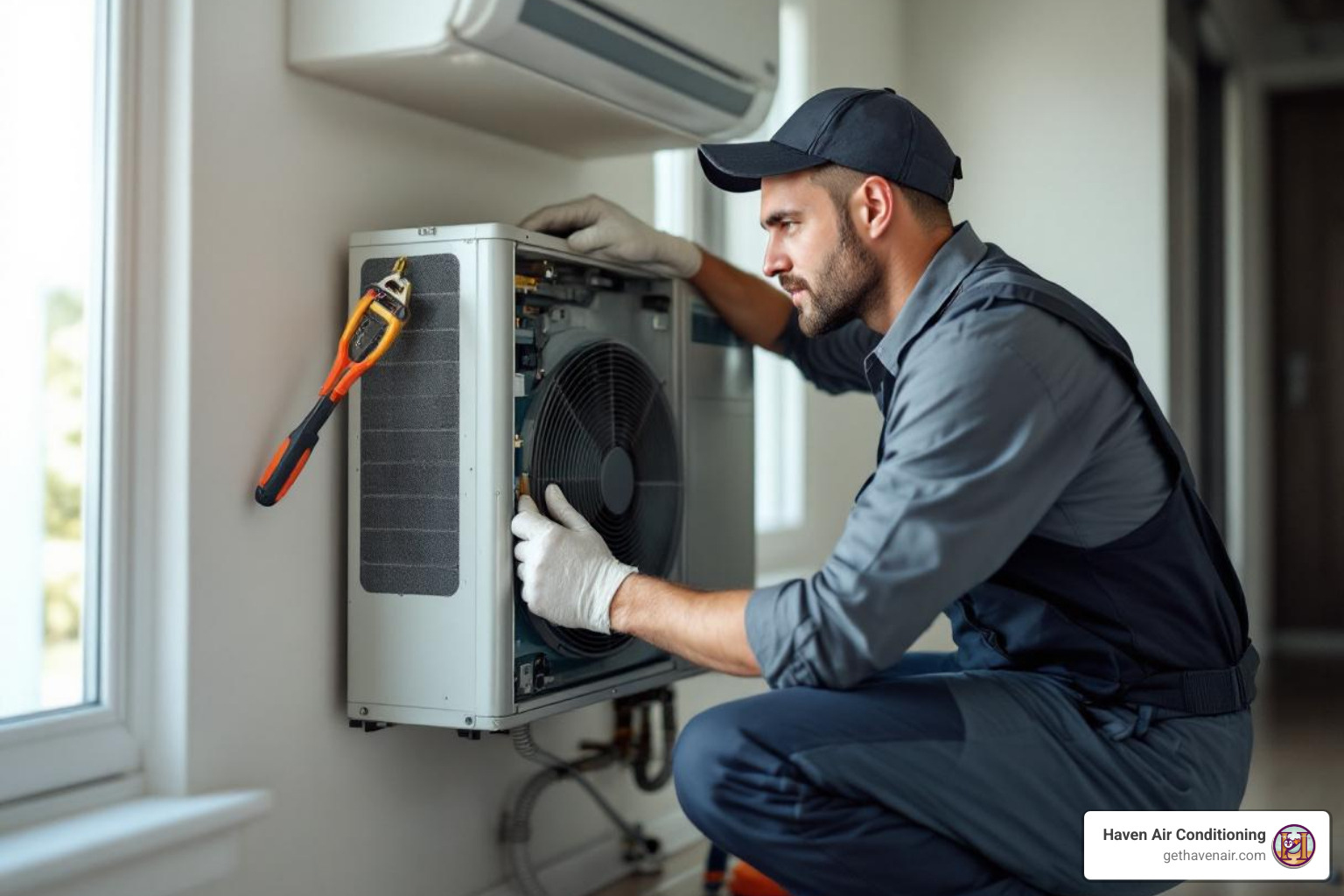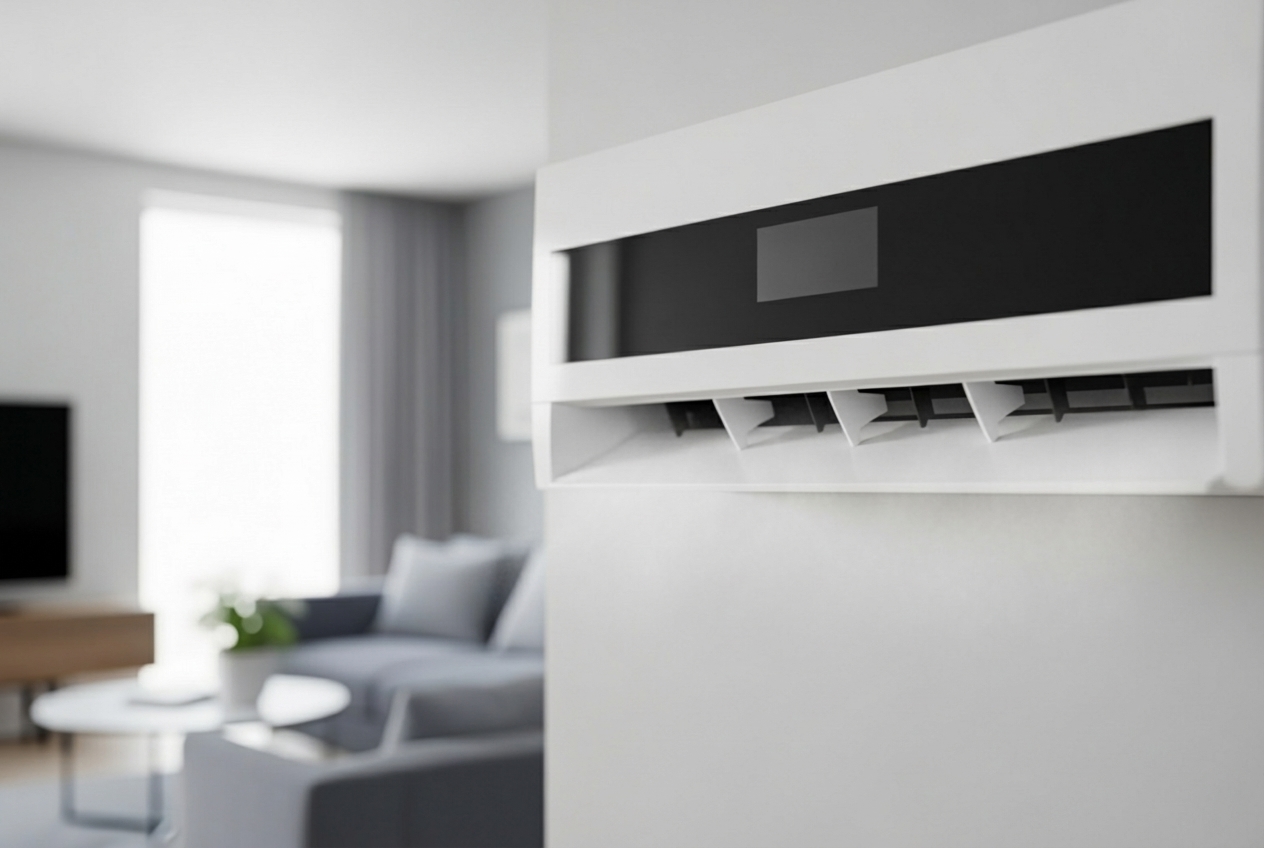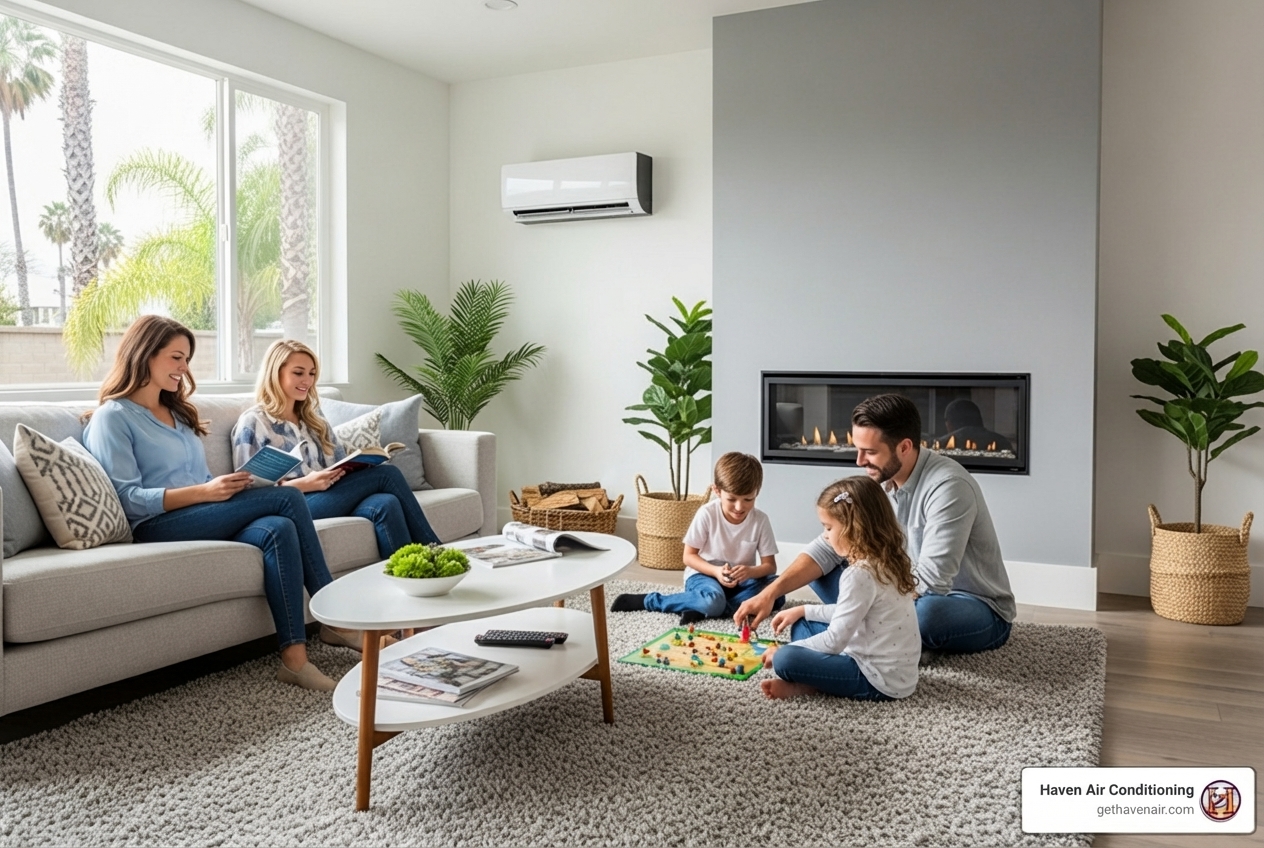Discover the truth about air conditioning and its impact on your health. Learn how to prevent potential illnesses and maintain a healthy indoor environment.
How Do Air Conditioning Systems Work?
To fully grasp the potential health effects, it is crucial to comprehend the functioning of air conditioning systems. These systems employ different components and processes to cool and dehumidify indoor air, ensuring a comfortable and healthy environment by regulating temperature, humidity, and air quality.
Air conditioning units function by removing heat from indoor spaces and transferring it outside through a process called refrigeration. This involves four main components:
- Compressor: Pressurizes refrigerant gas to increase its temperature.
- Condenser: Releases heat from the hot refrigerant gas into the surrounding environment.
- Expansion valve: Regulates the flow of refrigerant into the evaporator coil.
- Evaporator coil: Absorbs heat from warm air passing over it and transfers it to the refrigerant.
This cycle continues until your desired temperature is reached. Understanding how these systems work and recognizing their importance in maintaining a healthy living environment allows you to take proactive steps towards preventing any potential health issues associated with poorly maintained air conditioning units.
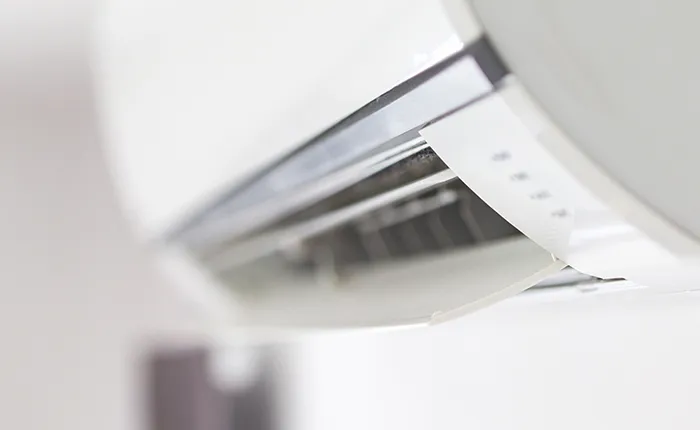
Importance Of Regular Maintenance & Cleaning
Regular maintenance is essential for keeping your air conditioning system running smoothly, efficiently, and safeguarding your health. Here’s why:
- Energy efficiency: Regular maintenance ensures peak efficiency, reducing energy consumption and lowering utility bills.
- Extended lifespan: Prevents major breakdowns or costly repairs, prolonging the life span of your unit.
- Indoor air quality: Filters out dust particles, allergens, mold spores, and other pollutants from circulating in your home or office space.
The Impact Of Air Conditioning On Your Health
Discover the connection between air conditioning and health, as well as the common illnesses associated with poorly maintained systems.
Poorly maintained air conditioning systems can become breeding grounds for bacteria, mold, and other harmful microorganisms. When these contaminants are circulated throughout your home or office, they can cause respiratory problems, allergies, and other health issues.
Air conditioning sickness, Legionnaires disease, and Sick Building Syndrome (SBS) are some of the common illnesses associated with poorly maintained air conditioning systems. These illnesses can cause symptoms such as headaches, dizziness, nausea, fatigue, eye irritation, skin irritations, difficulty concentrating, and respiratory problems.
Identify the symptoms of air conditioning sickness to take prompt action and differentiate them from general illnesses:
- Breathing Issues: Frequent coughing, wheezing, or difficulty breathing indoors may indicate an issue with your AC system.
- Headaches and Dizziness: Persistent headaches and dizziness can be signs of poor indoor air quality caused by mold or bacteria growth within the cooling unit.
- Skin Irritation: Increased skin rashes or itchiness could be linked to harmful particles circulating through your improperly maintained AC system.
- Nausea and Fatigue: Feeling nauseous or fatigued without any apparent reason might be connected to contaminants accumulating within the system.
- Eye Irritation: Redness, itching, and watery eyes are often associated with poor indoor air quality resulting from neglected maintenance practices on your HVAC unit.
It’s important to note that these symptoms may vary depending on individual sensitivity levels and overall health conditions. However, if you consistently experience any combination of these symptoms when spending time indoors with an operating AC system, it’s essential to consider the possibility of air conditioning sickness.

Benefits Of Air Conditioning For Health
- Maintaining a comfortable indoor temperature is essential in preventing heat-related illnesses like heat stroke or heat exhaustion, safeguarding your health and well-being.
- By regulating humidity levels, you can effectively reduce the growth of mold, mildew, and dust mites, minimizing the risk of allergies and respiratory issues.
- Improved air quality, achieved through filtration and ventilation, helps eliminate pollutants, allergens, and airborne particles, promoting optimal respiratory health.
- For individuals with respiratory conditions like asthma, air conditioning creates a more comfortable environment by reducing irritants and allergens in the air, enabling better breathing and overall comfort.
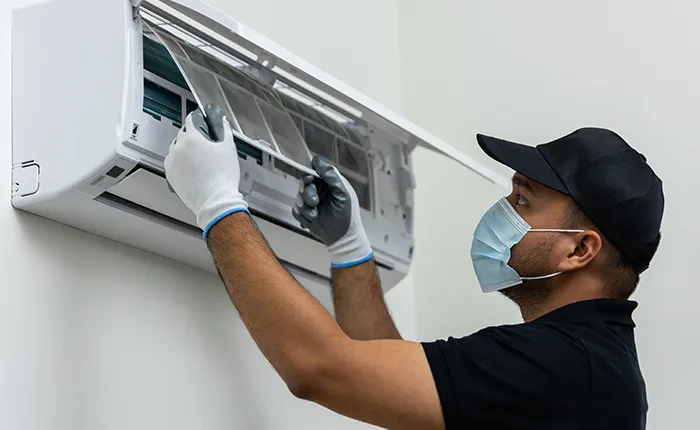
Ensuring proper ventilation is essential for maintaining excellent air quality. Air conditioning systems should be adequately ventilated to facilitate the intake of fresh air and the removal of stale air. Combining air conditioning with natural or mechanical ventilation systems can effectively promote a healthy indoor environment with optimal air circulation and freshness.
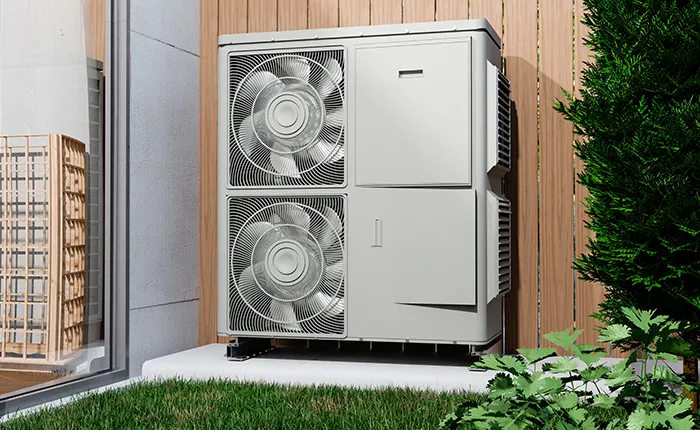
Air Conditioning Side Effects
Although air conditioning provides various advantages, it’s crucial to acknowledge potential health effects. Certain individuals may encounter specific health issues linked to air conditioning, such as:
1. Allergies
Inadequately maintained air conditioning systems have the potential to accumulate dust, allergens, and other particles, which may provoke allergies or respiratory issues, particularly in individuals who are sensitive.
2. Asthma
People with asthma may find relief in air conditioning as it can decrease humidity and filter allergens. However, inadequate maintenance and exposure to cold air drafts can potentially provoke asthma symptoms in susceptible individuals.
3. Respiratory Problems
Extended exposure to the dry air produced by air conditioning systems can result in dryness in the airways, potentially causing respiratory discomfort or worsening pre-existing respiratory conditions.
4. Dry Skin
The use of air conditioning can reduce humidity levels, resulting in dryness of the skin and the possibility of skin irritation. Applying moisturizers and ensuring proper hydration can help alleviate symptoms of dry skin caused by air conditioning.
5. Eye Irritation
Insufficient humidity levels caused by air conditioning can lead to dry and irritated eyes. To mitigate these symptoms, it is recommended to blink frequently, utilize eye drops, and maintain a suitable humidity level in the environment.
6. Headaches
Extended periods of exposure to cold air drafts or abrupt temperature fluctuations resulting from air conditioning can potentially induce headaches in certain individuals. To minimize the likelihood of experiencing such discomfort, it is advisable to maintain a moderate and steady temperature.
7. Fatigue
Spending prolonged periods in air-conditioned environments can occasionally lead to sensations of fatigue or sluggishness. These effects may stem from factors like low humidity, cool temperatures, or insufficient air circulation. Taking breaks in fresh air, maintaining proper hydration, and ensuring adequate ventilation can assist in alleviating feelings of fatigue.
8. Dehydration
Improper management of air conditioning can potentially result in dehydration. The cold air may diminish our sensation of thirst, causing insufficient fluid intake. It is crucial to prioritize hydration by consuming water consistently, even if you do not experience strong thirst sensations.
9. Spread Of Diseases
When air conditioning systems are not adequately maintained, they can become breeding grounds for bacteria, mold, and other microorganisms. If left unaddressed, these organisms can contribute to the transmission of diseases or respiratory infections. To mitigate these risks, it is important to regularly maintain and clean air conditioning units.
10. Indoor Air Quality
Although air conditioning systems can enhance indoor air quality by effectively filtering out pollutants, it is important to note that insufficient maintenance, dirty filters, or poorly designed systems can have a detrimental effect on air quality. To uphold good indoor air quality, regular maintenance, cleaning or replacing filters, and ensuring proper ventilation are crucial.
Preventing Air Conditioning Sickness
Maintain your air conditioning system to prevent illness caused by poor indoor air quality:
- Regular Maintenance: Schedule routine maintenance for your air conditioner at least once a year to identify any potential issues and ensure all components are functioning properly.
- Cleaning Filters: Clean or replace the filters regularly to remove dust, allergens, and other harmful particles that restrict airflow and reduce efficiency.
- Duct Cleaning: Consider professional duct cleaning every few years to remove accumulated dirt, dust, mold spores, and other contaminants circulating through the system.
- Proper Ventilation: Keep windows open whenever possible or use exhaust fans in moisture-prone areas like bathrooms and kitchens to ensure proper ventilation.
- Control Humidity Levels: Use dehumidifiers if needed to maintain optimal humidity levels (around 40-50%) and prevent mold growth.
- Keep Your Home Clean: Regularly clean surfaces in your home to minimize dust accumulation that could circulate through the HVAC system.
- Avoid Smoking Indoors: Smoking indoors introduces harmful chemicals into the air, negatively impacting both you and your HVAC system’s performance.
- Check for Leaks: Inspect around windows, doors, vents, and ducts for any leaks or gaps where outside pollutants could enter your living space.
- Seek Professional Help When Needed: If you notice persistent symptoms related to poor indoor air quality despite following preventive measures or suspect an issue with your AC unit itself, seek professional help from a certified HVAC technician.
By following these preventive measures, you can ensure that your air conditioning system not only keeps you cool but also maintains a healthy indoor environment promoting overall well-being in your home.
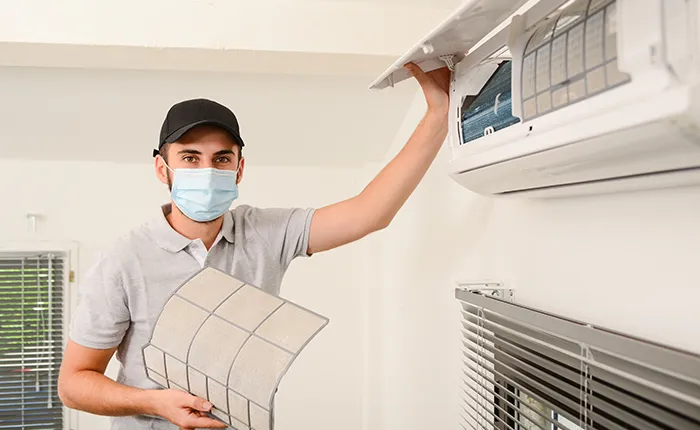
By following these guidelines and considering individual health needs, you can enjoy the benefits of air conditioning while minimizing any potential health risks.
For professional air conditioning installation, maintenance, or repair services, contact us or visit our AC page for more information.
What Happens If We Sit In AC For A Long Time?
- Dehydration: Air conditioning can dry out the air in a room, leading to increased evaporation of moisture from your skin and respiratory passages. This can result in dehydration, especially if you don’t drink enough water while in the AC.
- Dry Skin: Spending extended periods in an air-conditioned environment can cause your skin to become dry, itchy, and flaky. Moisturizing your skin regularly can help alleviate this issue.
- Respiratory Issues: Some people may experience respiratory problems or worsened symptoms if they already have conditions like asthma or allergies. The dry air in AC environments may irritate the respiratory passages.
- Body Temperature Regulation: Constant exposure to cold air can disrupt your body’s natural ability to regulate its temperature. When you step out into warmer environments, you may feel a significant temperature difference, potentially leading to discomfort or even heat-related illnesses if you don’t adapt quickly.
- Muscle Stiffness: Staying in one position for a prolonged time, such as sitting in the same chair while using AC, can lead to muscle stiffness and discomfort.
- Sick Building Syndrome: In some cases, poorly maintained air conditioning systems can contribute to indoor air pollution and the development of sick building syndrome. This can cause symptoms like headaches, fatigue, and respiratory issues.
To mitigate these potential issues, it’s essential to take breaks from AC environments, stay well-hydrated, and maintain a moderate temperature setting. Additionally, proper ventilation and maintenance of AC systems can help improve air quality and reduce potential health risks.
Is It OK To Use AC All Day?
Yes, it is generally okay to sleep in a room with air conditioning (AC). In fact, for many people, sleeping in a cool and comfortable environment can promote better sleep quality and overall restfulness. However, there are some important considerations to ensure that sleeping with AC is safe and beneficial:
- Temperature Setting: Set the AC to a comfortable temperature that suits your preferences. The recommended range for sleeping is typically between 60°F to 67°F (15°C to 19°C), but individual preferences may vary.
- Air Quality: Ensure that the AC system is well-maintained, and the filters are clean. Proper maintenance helps prevent the buildup of dust, allergens, and other pollutants in the room, which can affect air quality and potentially lead to respiratory issues.
- Ventilation: If possible, allow for some natural ventilation, especially during mild weather, to bring in fresh air and maintain air circulation in the room.
- Avoid Extreme Settings: Avoid setting the AC to extremely cold temperatures, as this can lead to discomfort and potential health issues, such as dehydration or muscle stiffness.
- Bedding and Clothing: Choose appropriate bedding and sleepwear for the temperature. Use breathable and lightweight fabrics during warm weather to avoid overheating.
- Personal Comfort: Everyone has different preferences when it comes to the sleep environment, so pay attention to your own comfort. If you find that sleeping with AC negatively impacts your sleep or health, consider alternative cooling methods or adjust the temperature settings.
Is 28 Degrees Good For AC?
A temperature of 28 degrees Celsius (82.4 degrees Fahrenheit) is relatively warm for an air conditioning setting, especially if you are using it to cool an indoor space. It might be considered too warm for some people’s comfort, particularly in hot weather or if you are trying to achieve a cooler indoor environment. The ideal temperature for an air conditioner will vary depending on individual preferences, the climate, and the purpose of cooling the space. Here are some general guidelines for AC temperature settings:
- Comfortable Range: For most people, a comfortable indoor temperature with AC is typically between 20°C to 24°C (68°F to 75°F). This range is neither too cold nor too warm for the majority of individuals.
- Energy Efficiency: Setting the AC to a higher temperature, such as 24°C or slightly above, can help save energy and reduce electricity costs compared to lower settings.
- Sleeping Environment: The ideal sleeping temperature is generally between 15°C to 19°C (60°F to 67°F). However, this can vary from person to person, and some may find 24°C comfortable for sleeping.
- Outdoor Conditions: Consider the outdoor weather conditions when setting your AC temperature. In hot and humid climates, you may need a lower temperature to achieve a comfortable indoor environment.
- Health Considerations: If anyone in the household has health issues that require a specific temperature, such as respiratory conditions or heat sensitivity, adjust the AC accordingly.
Ultimately, the “ideal” temperature for an AC setting is subjective and will depend on your personal comfort preferences and the surrounding conditions. Experiment with different settings to find what works best for you, and remember to balance comfort with energy efficiency to optimize your AC usage.


